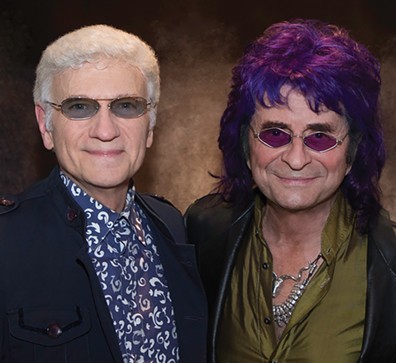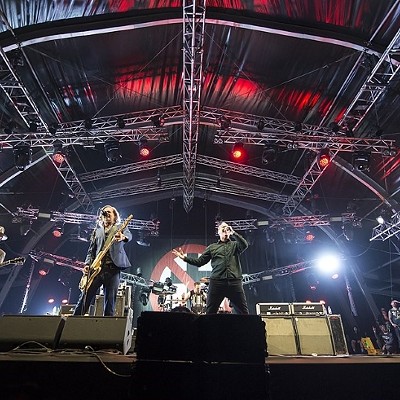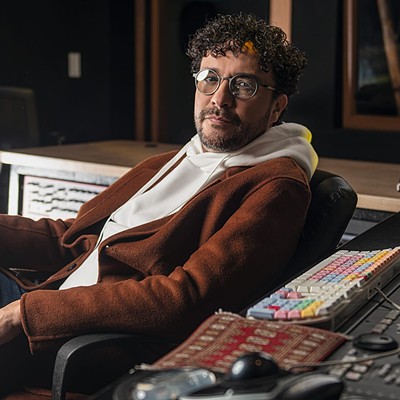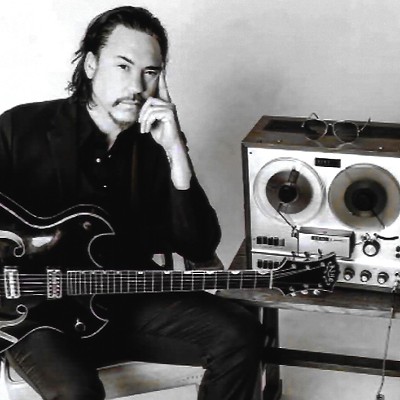“This morning, my sweatpants stormed into my bedroom…and demanded that I wash them! My wife has insisted on six foot distancing with just the two of us in our house. Including the lovemaking. She said it’s never been better! Does that sum it up? Make sure you tip your waitresses!” he spits out rat-a-tat with the impeccable timing of an old Catskills comic, before turning more serious.
“This pandemic, it’s the great leveler of the human race. And that’s sobering. It’s making everyone on the world consider our fallibility, and think about things we try our best not to think about” he says.
“But when rich people and celebrities say we’re all in this together…not exactly. Very few of us are worried about our next meal or mortgage payment. I would never be so arrogant to even think I’m in the same boat as most of my fans are. I make that clear, and I thank them for placing me in this position. But it still feels trivial to even talk about a new record.”
That record – 26 East: Vol. 1 (Frontiers Music SRL) was 2 ½ years in the making for the former Styx singer/songwriter/keyboardist. Its ten tracks manage to veer easily between wistful nostalgia, the tentative future, and very, very current events.
The title comes from the real-life address (in Roseland on the southside of Chicago) that DeYoung grew up in. It had a basement where in 1962 DeYoung and two twin brothers from across the street – Chuck and John Panozzo – would first play together and form the nucleus of the band that would eventually evolve into Styx. The three trains on the cover represent the three teens leaving the station to chase their dreams, with the name of their first group, the Trade Winds, emblazoned on one.
“In Chicago, everybody has a basement, but there was always the danger of flooding. So we always had to have our equipment up high when the rain got bad. The floor was forest green and the walls were white,” DeYoung remembers. “My grandfather Charlie lived right above where we rehearsed. He would always bang on the floor with his cane for us to keep it down. So we struck a deal. We told him when we were going to practice, and he got in his ’54 Chevy and drove to the tavern. If it could have been less glamorous, I don’t know how!”
This being the early ‘60s, though, the music the trio learned to play (Chuck on guitar, John on drums, and DeYoung on vocals and…accordion?) wasn’t exactly emanating from a teenage wasteland.
“There were no Beatles or rock bands then. We were trying to play our parents’ music that they loved out of fake books and please them. We were a wedding band with a small dream,” he says. “That all changed on 2/9/64 when the Beatles appeared on Ed Sullivan. Then we knew what we wanted to be. That’s when the big dream started.”
In the lead-off track, “East of Midnight” DeYoung recalls the rush of those early days hearing the latest music in his bedroom on a transistor radio – something today’s teens who can stream any song every recorded in history can’t fathom.
“We had to hear songs on the radio or in the car or a crappy record player with a nickel on the arm so it wouldn’t skip. So music was the focal point that connected us to the greater world,” he says. “Now, 16-year-old males can just look at porn on the internet, and music doesn’t seem so important anymore!”
There are also ballads (“You My Love”), reflections of life (“Damn That Dream,” “Run for the Roses”), and songs that somehow manage to take both a dim and promising view of the world and where it’s headed (“A Kingdom Ablaze,” “Unbroken,” “Promise of the Land”).
But that song that makes the most noise is “With All Due Respect,” a blistering, flamethrower of a rocker that takes to task the talking heads of TV and radio news, with the chorus: “With all due respect/You are an ASSHOLE/With all due respect/You make me sick/With all due respect/Plug up your pie holes/With all due respect/You don't deserve no damn respect!” It makes Don Henley’s “Dirty Laundry” look downright innocent by comparison.

Dennis DeYoung and Jim Peterik during the recording of "26: East: Vol. 1."
Photo by Kristie Schram/Courtesy of Freeman Promotions
“It’s all partisan. It’s not just the left or the right, but it’s both of them. People don’t like it when I say this, but the left should shut up about the fixation with Fox, because 80 percent of [the media] leans left.”
“With All Due Respect” was co-written by Jim Peterik ("Ides of March," "Survivor") who also plays multiple instruments and pushed DeYoung to work on the album when he wasn’t so sure about it. As did Frontier Records President Sefarino Perugino.
“Jim and I have two similar personalities in the same room with the same life experience and the same sense of humor…and we just cruised through it all. It was a joyous experience. And I’m indebted to him for that,” DeYoung says. That’s somewhat of a switch from his former group. “I was the possessed guy in Styx, always. The guy with the biggest ambition, the cheerleader, the guy at the center of it all telling everyone – probably wrongly – that we were better than we were!”
The fissure of Styx between DeYoung (who was fired from the band in 1999) and members Tommy Shaw and James “JY” Young is one of classic rock’s most bitter tales. Shaw and Young continue to record and perform under the band’s moniker, with guest appearances from Chuck Panozzo (John Panozzo died in 1996), while DeYoung has done the same, billed under his name. Their omission from the Rock and Roll Hall of Fame is one of that institution’s greatest snubs.

Julian Lennon and Dennis DeYoung during the recording of "To The Good Old Days."
Photo by Tim Orchard/Courtesy of Freeman Promotions
For the new record, despite the open-ended nature of its title – and the fact that there are plenty of other songs in the can - DeYoung certainly talks about 26 East: Vol. 1 as if it’s his last studio record and a farewell to fans. The last full song on the record – “To the Good Old Days,” features Julian Lennon on vocals and seems like a last look back to that Chicago basement and all the places it took DeYoung and the Panozzo brothers.
Lennon’s involvement stemmed from a straight-up Beatles homage DeYoung wrote called (in a nod to the Fabs’ own song with the same title) “Hello Goodbye.” “I did the demo and got the idea of involving Julian, but I realized that it wasn’t his story. Then I went to the piano and wrote ‘To the Good Old Days,’” DeYoung says. “I didn’t know him. I just sent a demo to his business manager and thought I’d never hear back. But Julian said he’d be honored to be on it. I mean, it was his dad’s band that gave me this great life I have. I’m trying not to tear up talking about it right now.”
The record actually ends with “A.D. 2020.” At less than a minute, it shares a melody with two other song snippets (“A.D. 1925” and “A.D. 1958”) and the smash hit “The Best of Times” from the 1981 Styx album Paradise Theater.
The now 73-year-old DeYoung’s words leave little room for interpretation: “And so my friends/I’ll say goodbye/For time has claimed it’s prize/But the music never dies/Just listen and close your eyes/And welcome to paradise.” And the last sound you hear are fading notes from DeYoung’s accordion. A sentimental video that combines both songs features video footage of DeYoung’s family, and includes the Panozzos.
“I wanted this album to be listening experience, from start to finish. And I wanted to end it with those two songs. It’s one thought process,” he sums up. “It’s the metaphor of what music – over all other art forms – does for human beings. It’s an organic, physical experience. No one can define it or explain it. But what it does so valuable. At my age today, when I hear from people what my music – and any music – has done for them…that’s magical.”
For more information on 26 East: Vol. 1 or Dennis DeYoung, visit Dennis DeYoung.com








